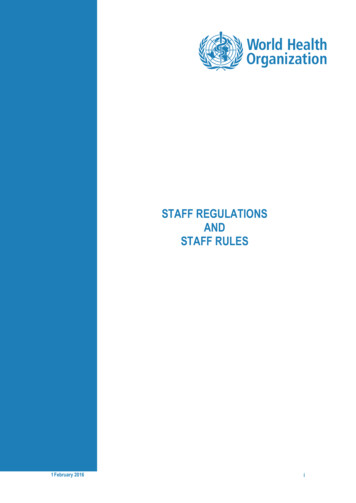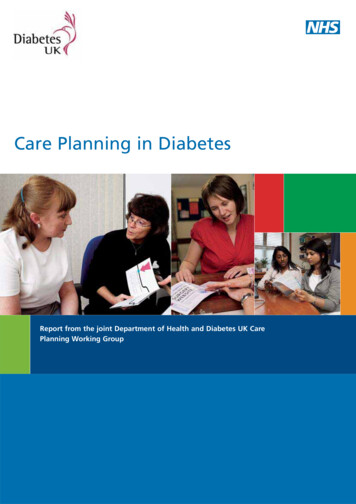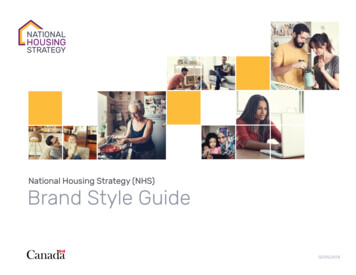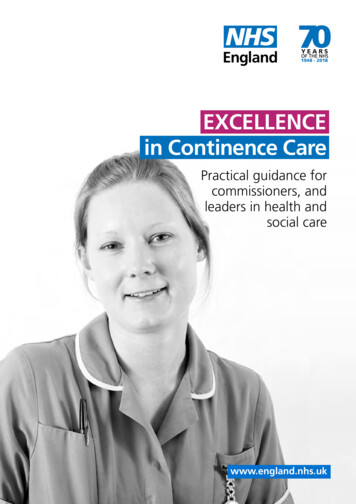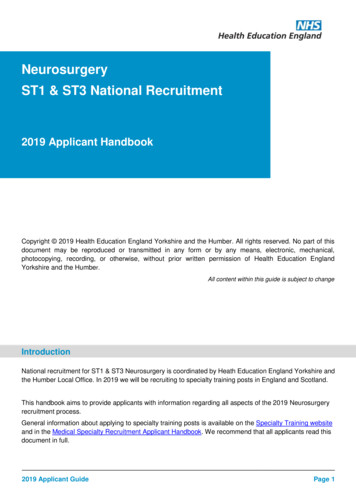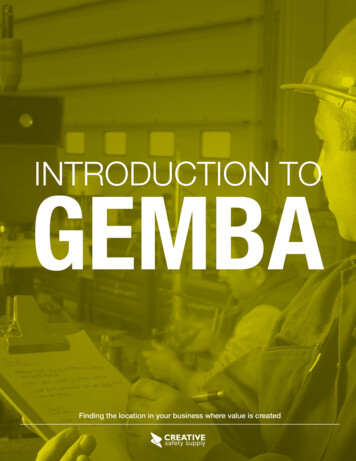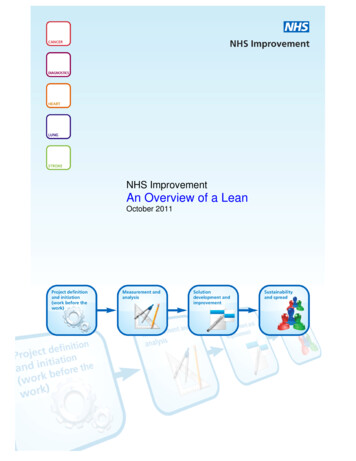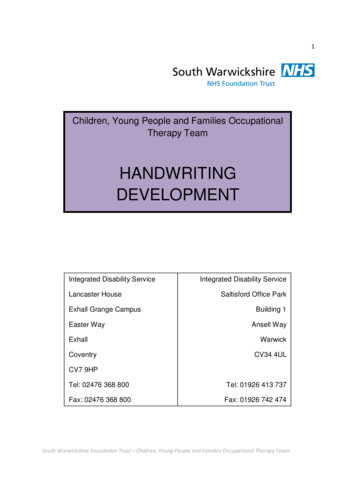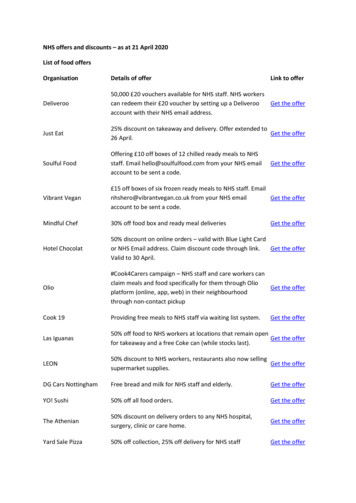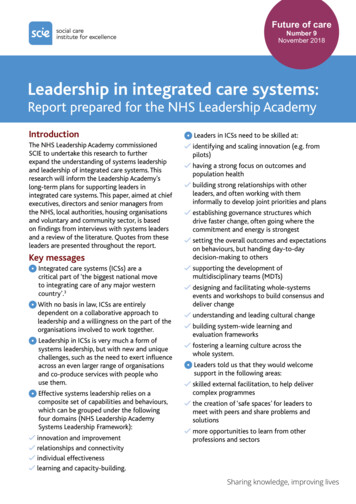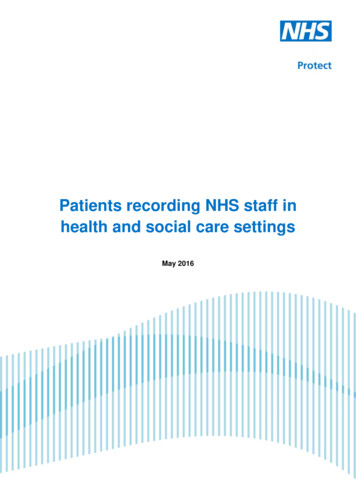
Transcription
Patients recording NHS staff inhealth and social care settingsMay 2016
Contents1. Background . .22. Purpose . 23. Risks . .34. Potential legal action . .35. Precautionary measures . .46. References. 67. Contact details . 61
1.BackgroundNHS Protect has received some enquiries that highlighted concerns about the overt andcovert recording (both video and audio) of medical consultations or treatments through theuse of portable recording devices on NHS premises or CCTV systems installed at home.Concerns were in particular about patients who covertly record their consultations in theirown homes using a hidden camera or mobile device and without the knowledge orpermission of those being recorded.Unlike medical professionals, who are expected by the General Medical Council1 to obtainpatients' consent to make visual or audio recordings, patients do not need their doctor'spermission to record a medical consultation or treatment. Patient recordings which are madeeither covertly and overtly in order to keep a personal record of what the doctor said aredeemed to constitute personal ‘note taking’ and are therefore permissible.It is, however, recognised that staff need guidance and advice about patients recordingconsultations or treatment being administered.NHS Protect has produced the good practice advice in this document for use in health andsocial care settings. It can be used to provide clarification to NHS clinical and non-clinicalstaff working within health and social care settings on dealing with situations where patientsare recording their treatment and care. This advice covers both covert and overt recording ofconsultations. However it predominantly concerns overt recording as the patient willgenerally ask NHS staff for permission for recording to take place.2.PurposeThis short guide has been developed to provide advice to Local Security ManagementSpecialists (LSMSs) to enable them to support and advise NHS staff on covert and overtrecording by patients.It will also assist LSMSs in raising awareness of the issues within their health bodies.Finally, the guidance can help trusts to develop or review local policies and procedures. Inparticular, it is recommended that trusts review their current mobile communication devicespolicy and incorporate the recommendations in this guide where relevant and applicable.This document is meant as guidance only and nothing in it constitutes legal advice. Itwill be for individual trusts to obtain their own legal advice on any specific case.3.RisksThere are no specific legal requirements that govern an individual making a personalrecording of their medical consultation or treatment, either overtly or covertly, for their privateuse. Recordings made to keep a personal record of what the doctors said are deemed toconstitute ‘note taking’ and are therefore permitted when undertaken for this purpose. Whilea patient does not require permission to record their consultation, common courtesy wouldsuggest that permission should be sought in most cases.1http://www.gmc-uk.org/guidance/ethical guidance/making audiovisual.asp2
The content of the recording is confidential to the patient, not the doctor or healthcare staff.The patient can waive their own confidentiality as they wish; this could include disclosing thedetails of their consultation with third parties or even posting and/or sharing the recording inunadulterated form on the internet through social media sites.The position may, however, change once a recording is no longer used as a record of theconsultation, for example where the recording is disclosed or publicised in a modified waywhich is not connected to the consultation. This could include an instance where it isdesigned to cause detriment to or harass another individual captured in the recording. Anysuch disclosure or publication, depending on the nature and context, may attract a civilaction for damages and may also be a criminal offence.For more guidance please read in conjunction with NHS Protect’s document ‘Misuse ofsocial media to harass, intimidate or threaten NHS staff’.Data Protection Act 1998The recording of a consultation is likely to constitute processing of personal data under theDPA and as such it has to comply with the provisions of the DPA. There is an exemption inthe DPA where personal data is processed by an individual for their own personal purposes.In such cases, the ‘processing’ does not engage the data protection principles of the act (the‘domestic purposes’ exemption). However, further processing of the data would have tocomply with the DPA.Information GovernanceInformation governance refers to the legal and procedural framework that safeguards andensures the appropriate use of patient and personal information by an organisation.It is important to note that a patient’s own private recording is not an information governanceissue. As the Trust is not responsible for generating or making the recording, it is not liablefor safeguarding the confidentiality, integrity or security of such material.4.Potential legal actionIf any part of the covert or overt recording of the patient’s consultation is disclosed to a thirdparty without the prior consent of the other recorded parties, then depending on the natureand the context of such disclosure, a criminal offence may be committed, civil legal actionmay be taken, or a breach of the DPA may occur.Criminal offencesCriminal offences could arise from unauthorised disclosure, depending on how thatdisclosure or publication is made. However, the most likely offences could include an offencecontrary to section 1 of the Protection From Harassment Act 1997, an offence contrary tosection 4, 4A or 5 of the Public Order Act 1986, an offence contrary to section 1 of theMalicious Communications Act 1988 or an offence contrary to section 127 of theCommunications Act 2003.This list is not exhaustive and the specific offence charged would depend on the facts. Forfurther information on the provisions of legislation referred to above please see the relevant3
chapter in the NHS Security Management Manual. Specific advice can be sought from NHSProtect’s Legal Protection Unit.Civil actionDefamationActions for libel can be brought in the High Court for any published statements which arealleged to defame a named or identifiable individual (or individuaIs; under English lawcompanies are legal persons, and allowed to bring suit for defamation) in a manner whichcauses them loss in their trade or profession, or causes a reasonable person to think worseof him, her or them. A statement can include an implication; for instance, a photograph orimage in a particular context (for example, a photograph with an accompanying headlineimplying wrongdoing or incompetence) could be held as a personal allegation about theindividual featured in the photograph.Civil remediesInjunctionsAn injunction is a civil court order which orders a person to ‘stop’ or to ‘do’ a particular act orthing. A breach of an injunction is generally punishable as contempt of court and in somecases can lead to imprisonment. Interim injunctions can be sought to restrain publicationwhere it is known that someone intends to publish defamatory material.To obtain an interim injunction the aggrieved party must be able to show that they have asubstantive cause of action. Injunctions are an ‘equitable’ remedy, which means the court isnever obliged to grant them but will exercise its discretion to do so taking into account theconduct of the parties and all the relevant circumstances.An interim injunction to restrain publication would be likely where a hospital becomes awareof someone’s intention to publish something defamatory about staff at that organisation. It isunlikely to apply in circumstances where such a recording of a consultation has already beendisclosed or published. In this situation, seeking damages may be the most likely remedy(please see below).Further advice on injunctions can be sought from NHS Protect’s Legal Protection Unit.DamagesDamages are the main means by which somebody who has been defamed can seekredress. General damages are claimed to compensate for a loss of reputation, and specialdamages to compensate any financial loss incurred as a result of the defamation.5.Precautionary measuresWhere an NHS organisation does not have a specific policy in place covering covert andovert audio or video recordings made by patients, then it should seriously considerintroducing one. If a policy on patient recording (or a related policy) exists, then including asuitable section to address the issue of patients recording staff (irrespective of the mediumused) may suffice. Information leaflets or notices should inform patients and those4
accompanying them that disseminating a recording of the consultation without the consent ofothers featured in it, depending on the nature and context of such disclosure, may lead tothe commission of a criminal offence or result in civil proceedings.By way of example, we would propose something along the following lines:Overt patient recordingsAlthough we cannot place restrictions on a patient wishing to record notes of aconsultation or conversation with a health professional, where it is felt absolutelynecessary by the patient to do so, we should ensure that: any recording is done openly and honestlythe recording process itself does not interfere with the consultation process orthe treatment or care being administeredthe patient understands that a note will be made in their health record statingthat they have recorded the consultation or care being providedthe patient is reminded of the private and confidential nature of the recordingand that it is their responsibility to keep it safe and secureany recording is only made for personal usepatients are aware that the misuse of a recording may result in criminal or civilproceedingspatients are discouraged from undertaking recordings in the first place, unlessit is deemed absolutely necessary by highlighting the above responsibilities.Covert patient recordingsAlthough we cannot place restrictions on a patient wishing to covertly record aconsultation or conversation with a health professional, where organisations areaware that covert recording is a significant issue they should aim to discouragepatients from doing so by ensuring that: the organisation promotes the open and honest recording of consultations,where a patient deems it absolutely necessary (see the advice above, whichapplies equally to covert recording)patients are aware that the organisation takes proactive steps to investigateand address any issues regarding the patient’s treatment and care, to avoidthem feeling it necessary to record their consultationrelevant staff should consider providing patients with a written recordsummary, and or a verbatim record (if practical) of their consultation for theirown personal usepatients are advised that they are entitled to see their notes, if they so wish,by informally asking the healthcare professional in charge of the consultation,or to request a paper copy of their medical notes formally through a SubjectAccess Request (SAR) made under the Data Protection Act 1998patients are given information on how they can complain if they have an issuewith their treatment and care, and their attention is drawn to the relevantguidance from the Care Quality Commission (see below) and InformationCommissioner’s Office.5
Further guidanceThe Care Quality Commission has published information for people who are thinking aboutusing hidden cameras or any type of recording equipment to monitor someone's care,‘Thinking about using a hidden camera or other equipment to monitor someone’s care’(CQC, 2015). The guidance is aimed at families, carers and people who use health and careservices, for the purpose of monitoring and protecting theirs (or their loved one’s) care,welfare and safety, and sets out some of the things to consider if they are thinking of usingrecording equipment, as well as explaining other steps they can take to raise their concerns.6.ReferencesCare Quality Commission, ‘Thinking about using a hidden camera or other equipment tomonitor someone’s care’ 150212 public surveillance leaflet final.pdfDepartment of Health, ‘Using mobile phones in NHS hospitals’, 130107105354/http:/www.dh.gov.uk/prod consum dh/groups/dh digitalassets/@dh/@en/documents/digitalasset/dh 092812.pdfInformation Commissioner’s Officehttps://ico.org.uk/7.Contact detailsAny enquiries about this document should be directed to the Policy and Standards or LegalProtection Unit email inbox (Policy@nhsprotect.gsi.gov.uk or LPU@nhsprotect.gsi.gov.uk).6
staff working within health and social care settings on dealing with situations where patients are recording their treatment and care. This advice covers both covert and overt recording of consultations. However it predominantly concerns overt recording as the patient will generally ask NHS staff for permission for recording to take place. 2. Purpose This short guide has been developed to .
